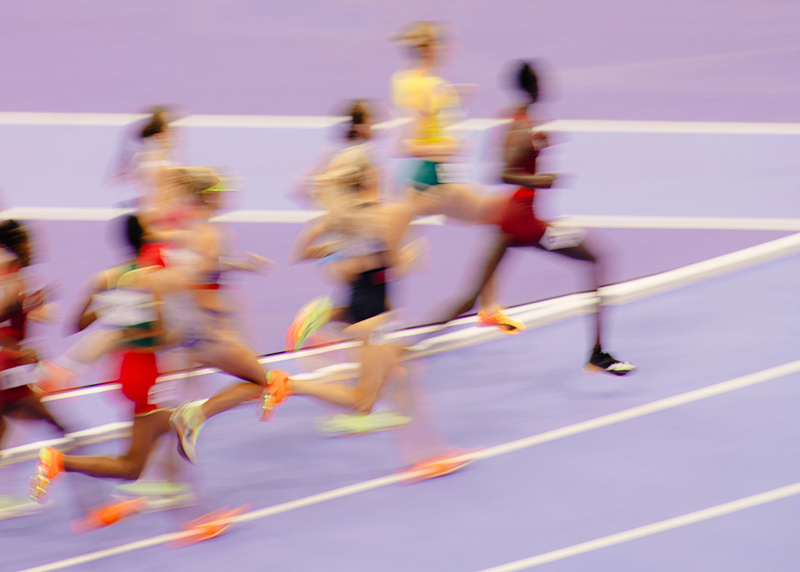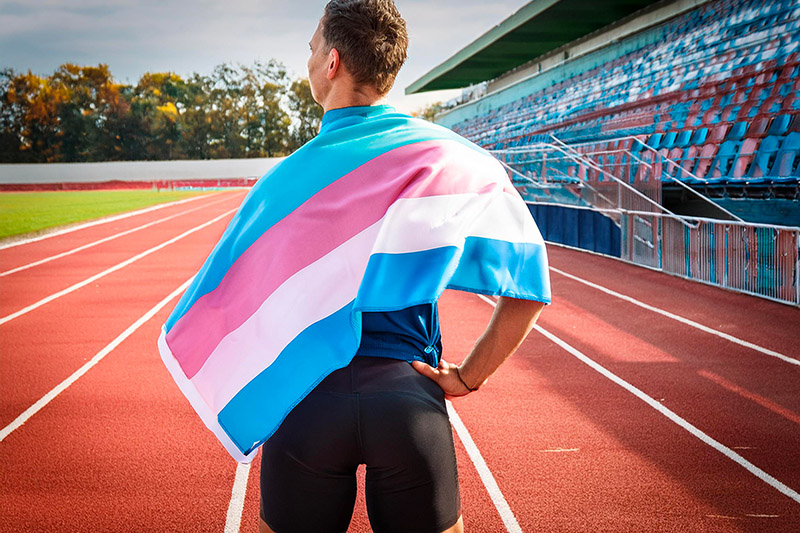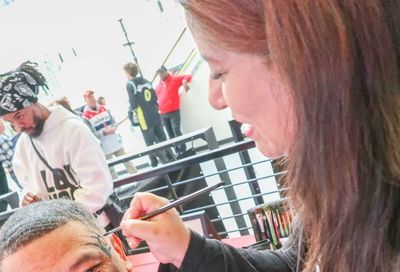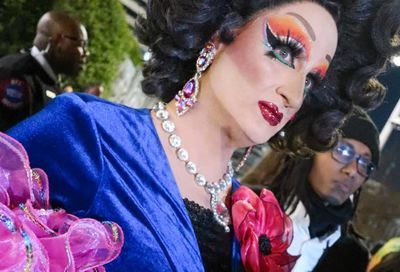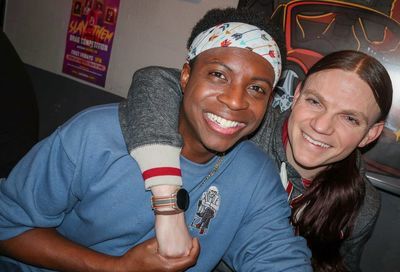Field Goals
Wade Davis talks about life on the gridiron, after the NFL and out of the closet
MW: There is a lot of talk these days about CTE (chronic traumatic encephalopathy) and concussion issues in the NFL. I saw Charles Barkley talking about how he felt that basketball and soccer were going to see more kids playing because parents were going to start keeping their children out of football. How do you feel about this, as somebody who got his life in large part through playing football?
DAVIS: If I had a kid I’d let him play football, if he wanted to. Football’s done some amazing things for me. I think it’s hard to take one thing out of a sport and crucify it because of it. Yes, there are a lot of things that need to be changed to make it safer, but there are a lot of things that football gave me. It gave me a sense of worth. It gave me a work ethic. It gave me a sense of family, a sense of community that I may not have gotten anywhere else. It allowed me to find myself and to see my own strength.
MW: Did you ever have concussions?
DAVIS: I remember getting at least two concussions. I never missed a game because of it. That says a lot. But you’re taught that ”you can’t make the club in the tub” — if you’re hurt, especially if you’re a free agent like I was, you can’t miss playing time. The mentality of sports has to change as well, so that a player doesn’t lose his job if he’s out with a concussion. But it’s also a business at the same time, so there are so many things that need to be reconciled. The fact that I have a concussion and I miss two weeks of training camp and I’m a rookie, it means you’re probably cut. There’s nothing you can do about it. So you’ve got rookies who are going to play, who won’t say a word.
But that also happens in soccer, it happens in basketball. Players get concussions all the time in those sports, probably not as often, but they play through it. No one can tell me Michael Jordan hasn’t had a concussion in his life. It probably doesn’t happen as often, but it does happen.
MW: These days you’re playing with the gay flag football league. From your own story, you seemed shocked to discover there were sports in the gay community.
DAVIS: Oh, so shocked.
MW: Even when you were first coming into the gay community, moving to New York, why did you still have that idea that gay men don’t do sports?
DAVIS: Again, it’s the masculinity thing. You’re taught that gay men are weak. I got interviewed by this guy on the radio in Chicago and he was like, ”Come on, man, it’s true, gay guys just aren’t as tough.” People actually believe that. I wanted to say, ”If we go outside right now, I will run through you like a Mack truck.” And it’s not even that I’m bigger and stronger, but I have an attitude that comes from playing ”Smear the Queer” where I know at the end of the day you’re going to have to kill me in order to stop me.
That’s why I struggled playing in the gay flag league, because my competitiveness didn’t match. One of my good friends, he’s a good friend of mine now, but when I first was in the league he went up for a pass and I picked the pass off. He fell down to the ground, and I looked down and was like, ”You’d better get in the fuckin’ weight room, kid.” But that was how I acted in football. And they hated me. People in the league hated me for years. I remember a team cheering that I got hurt, because I was that big of an asshole. And I came back on the field saying, ”Bitches, I’m back, what are you gonna do now?”
But that’s just me, so it was very hard for me to play in the gay league. But now I’ve transitioned. I had to stop playing, because my mentality is such that whether I’m playing with gay people or not, I’m going to fucking dominate you and that’s all that I know how to do. I’ll join the board, I’ll teach, but I can’t play anymore, because I’m an asshole on the football field. I’m a different person.
MW: So you’re not playing anymore at all?
DAVIS: I’m the captain of our traveling team and I also play very sparingly in our regular league. I do a lot of teaching and educating and getting guys to understand the game. I think people, straight or gay, don’t understand the small things about the game: what keeping your head on the swivel is; or about going where the quarterback’s going to be, not where he’s at. That’s what I feel like my gift to the league is.
MW: Weren’t you a little overqualified for playing in the league in the first place?
DAVIS: [Laughs.] Definitely, definitely. When I first joined I was like, ”There ain’t shit that you all can do, I’m just better than everyone’s thought about being their whole life.” But now I’m like, some of these guys are really good. There are some guys in this league who could probably have played in college.
Now I’ve got bad knees, so whew, I’ve gotta quit because I’m not the best guy out there anymore. But I’m still having the best time. I’ve met some of the greatest people from San Diego or Phoenix or Chicago, gay guys from across the country. I won’t play in tournaments anymore, but I’ll keep going to them just to keep the friendships going, because the guys are just amazing. Everyone is. People like me now that I’ve become less of an asshole. I’ve evolved. I’ve learned how to play and not talk shit. But I did talk shit this last tournament. Sometimes it just comes out.
MW: Well, there’s talking shit and then there’s being an asshole.
DAVIS: I really don’t have a middle ground. It just comes out, I can’t help it! [Laughs.]
MW: Why did you time your coming out as you did, a few years after you left the NFL?
DAVIS: A few years ago, when [Outsports writer] Cyd Zeigler asked me to do the article, I wasn’t ready. Now, with the work that I do — whether it’s with Hetrick-Martin or with GLSEN or the Obama campaign or the Black AIDS Institute — I’m doing work that can effect change. My voice actually counts. When I first left the NFL, I didn’t feel that me being a gay athlete would have counted for anything. But now I love myself again. Back in those days I still didn’t. I hated myself for so long because I believed that being gay was awful. Now I love the gay side of Wade, so I can talk to kids about the process that they have to go through in order to start loving themselves again.
I feel like I understand my focus now. I understand what I’m supposed to do. A lot of people want me to work with gays and sports issues. But, really, there’s enough people talking about that. My focus is going to be on being a role model to change the lives of youth of color, who are impacted by oppressions that people aren’t talking about. There aren’t other black people out there who have my voice, for lack of a better word, who are doing the work. So that’s what I want to do. I want to work with LGBT youth of color to make sure that HIV rates get lower, that homelessness is talked about, that poverty is talked about. And I’ll use the fact that I played in the NFL to promote that.
MW: Have you and your partner gotten married in New York?
DAVIS: We’re just talking about it, about that and about kids. As of right now, we would be getting married in Hawaii so his parents can come over from Australia, and then have a big reception in New York for our friends, because we can’t expect all of our friends to fly to Hawaii.
MW: Have you met his family?
DAVIS: The first time I went over there we were getting off the plane when he told me, ”My whole family’s going to be here.” I was like, ”Shit.” So there was his sister, both his brothers, their wives, their kids, his mother and his father. But I got off the plane and I remembered everyone’s name. It was cool. It was a little daunting, because I was the second partner they had ever met, and the first who was a black guy. His mother was very to the point, which I love about her. She’s like, ”You’re black and he’s white, how does it work?” I was like, ”I see that he’s white, but it’s not really an issue.” But I loved her for just being honest and getting it out there, because it’s something that people think about.
MW: Have you found that being in a relationship with a white guy is a barrier for you working with some of the communities you want to work with?
DAVIS: It hasn’t been yet, but I feel like it’s coming. [Laughs.]
MW: Right after this interview!
DAVIS: I don’t think that most people know that my partner is white. I hope it’s not a block, I hope that people understand that who I date doesn’t dictate what’s in my heart. Any man that loves me like I need to be loved and that I’m attracted to is fair game. It just happened to be that person was white. I get it that there are a lot of people out there who have these preconceived notions about what it means to be a black man who dates a white man, especially because I have privilege. But give me a chance first, sit down, talk to me. Understand that I’m not just a privileged black person who’s not getting his hands dirty, who doesn’t understand how the privileges that I have can oppress people, how the privileges that I have can oppress women, how the privileges that I have can oppress other gays. I’m trying to understand that and work to change that. And my partner’s behind me 100 percent. And he’s trying to educate himself about what it means to be a white man dating a black man.
I think a lot of it dates back to the history of what it meant to be black and to date someone white. It was illegal, it was frowned upon, you could be killed and jailed for that. A lot of people haven’t forgotten about that. And they shouldn’t. I shouldn’t forget about that, either. I think within the gay community, oftentimes you see people of color who are gay and they have white partners and people think, ”Oh, once you get money you leave your community, you don’t give back, you don’t do the work.” I want people to know that I’m still doing the work. And I think if you’re not doing the work, then we’re never going to get to that point where we’re taking care of our brothers and sisters.
Support Metro Weekly’s Journalism
These are challenging times for news organizations. And yet it’s crucial we stay active and provide vital resources and information to both our local readers and the world. So won’t you please take a moment and consider supporting Metro Weekly with a membership? For as little as $5 a month, you can help ensure Metro Weekly magazine and MetroWeekly.com remain free, viable resources as we provide the best, most diverse, culturally-resonant LGBTQ coverage in both the D.C. region and around the world. Memberships come with exclusive perks and discounts, your own personal digital delivery of each week’s magazine (and an archive), access to our Member's Lounge when it launches this fall, and exclusive members-only items like Metro Weekly Membership Mugs and Tote Bags! Check out all our membership levels here and please join us today!





